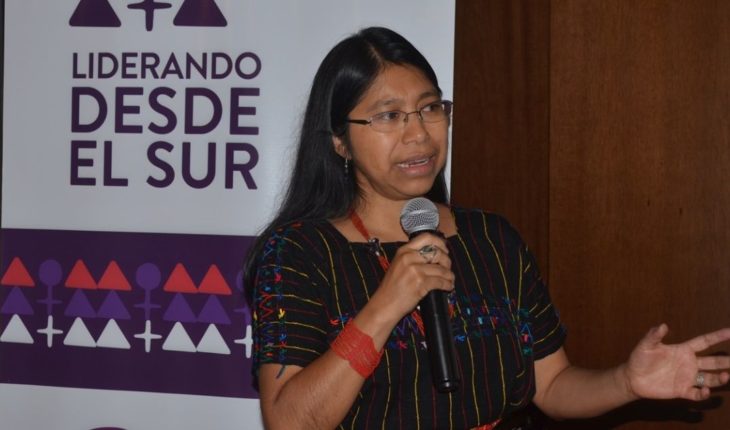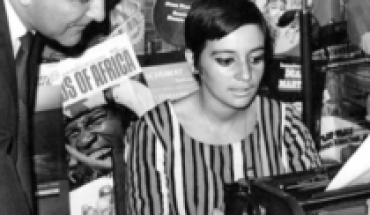“I always worked to eat but I was always for military for the rights of indigenous women”; Thus summarized in few words Teresa Zapeta history. 48 years, he currently holds the position of Executive Director of the international forum of indigenous women (FIMI). But get up there, it was not an easy road. She belongs to the Mayan community of Guatemala, and carries their identity with pride. In his veins embodies the struggle of hundreds of women from indigenous peoples, their country and all Latinoamerica.en dialogue with Filo.News, she gave more details about his tour up to where is located today and how, from his leadership position, provides to the visibility of problems of the indigenous communities. The case of Teresa Zapeta Foto: cutting edge News she was born in a village in Guatemala, and is the last of five brothers. “MOM,”a local community leader,”taught him to read: unable to complete elementary school, which was the highest educational level in the region.” My parents found form of economic enterprise, and we generate a family economy,”admitted with emotion in his voice. However, with the development of the Civil war in Guatemala that took place between 1990 and 1996, she and her family were displaced to the city by force. There, thanks to the support of their parents, could continue – though fresh to the 32 years-: he chose the career of social communication, and even held a master’s degree. When I lived in the rural environment, he was a victim of sexism. But when he came to the city, be boosted even further: “it came from a community, a village, and come to the city was a big impact. I spent rejection by my fellow students, there was some mistrust in the capabilities”.
FIMI “arriving at the city I realized that the education he had received was very low and limited; my colleagues obviously knew more than me. I felt this rejection, as of a treatment to people of one lower level than theirs”, explained. During his studies, he participated in several organizations of peoples and women, acquired experience and expertise in different areas. “In this way, acquired extensive experience: worked as an officer of Government, UN women, reaching FIMI.” I think that the opportunity of being in different areas allows me to also have a general idea of the life of women and indigenous peoples”, he acknowledged. Indigenous peoples in Guatemala photo: Centro Humboldt according to the annual report published by the United Nations (UN) in 2017, the total female population is 8.423.021 female – 50,79%. In this context, is one of the countries with the largest presence of indigenous population, with 40%. Currently, there are several organizations fighting for the defense of women within these communities: either the defender of indigenous women (DEMI) or the Presidential Secretariat for women (SEPREM). However, their results are gradual, and Guatemalan women continue to face problems of inequality and discrimination. What are the main problems that indigenous women in that country live? From the data established by the UN, the main problems faced are: rate of 48 per cent of indigenous women illiteracy and 19 per cent for non-indigenous women (INE, 2016).
High rate of fertility in girls adolescents aged 13 to 19 years (66.7 per 1,000 live births) according to data of the was, between January and September 2017 there were 9 assessments forensic physician for sexual offences against girls lactating, 348 girls from early childhood, 2,046 against adolescents and young women 705 294 of adult women.
High number of femicides: between 2012 and 2016, 254.160 women were aggrieved by the crimes referred to in the law against femicide and other forms of violence and 1,195 women were killed.
The rate of maternal mortality (140 per 100 thousand live births).
HIV epidemic concentrated, in which women represent 38 percent of adults with HIV (MOH, 2017).
Little or no involvement in politics: the Electoral law and political parties does not envisage quotas that attenuate the exclusion of women in public and political life.
High poverty rate: 79.2 percent and 76.1 per cent in rural areas.
They are mostly employed in the informal sector, i.e., housewives. In this way, they do not have access to the national system of social security, social protection or compensation programs.
Discrimination in first person photo: cutting edge News in this context, as a woman, as maya, trouble: in every place he went, was treated from a position of otherness. “I suffered the lack of opportunities in education and economic empowerment,” he explained.” I remember when I grew up, that non-indigenous people were with the right to tell other people you rise standing in a public bus because they had was to sit down”, he revealed. That imposition, he said, is not so explicit but still present. Stronger discrimination, he confessed, we live in public areas: “as many jobs, shops, schools, health care centers, match violence of gender violence by racism in indigenous women”, said. Then, added: “the lack of opportunities, public services, poverty, lack of financial resources to develop ventures or capabilities, all that indigenous women suffer”. A fight that is just beginning FIMI | Photo: Filo News according to the Mayan belief, we have a mission in life. Teresa has it well clear, and tries to convey that idea to his little 9-year-old son. “I say to make you feel proud to be Mayan, it explained that it may be that at school or in the spaces where you can be rejected for being indigenous,” he said. Zapeta said that it seeks to transmit to his son the spirituality of their community: “the family, respect elders, rating the food, that food is sacred.” The weekends try to go green places, so that he can have experiences with nature”, he said.” It has a mission have to meet as you grow. I still don’t know what is, not everyone came to know it, is a constant search. “Not only comes to work, live and already”, explained.
“It is important to move forward in the struggle for equality between people, genders, so come Western world”, said.
Every now and again to his people. It acknowledges the changes, looks like advanced infrastructure and the number of population. He remembers his beginnings and how suffered lack of opportunities. But also as he knew how to fight against adversity to enforce stereotypes laid down by society. Then back to the routine. It rises, enjoy the company of your family sharing a breakfast or any physical activity. Then take your computer and connects with all her classmates FIMI. What are its activities in that place? “I participated in meetings, events, I am active in my country, I am a political person, but I don’t participate in any party”, said. It is responsible for coordinating indigenous women’s Fund, the Observatory of violence against indigenous women, the global school of leadership of indigenous women, and many more. Therefore connects with women in Africa, Asia and Latin America, of the North and countries of the Artico.a reflection mode, Teresa concludes: “it is important to move forward in the struggle for equality between people, genders, for that come West world, to live well.” And for that we have to work all together”; She, from its place, adds his two cents, and extends valuable way in all Latin America with his work in the grouping and militancy by respect for diversity. In this note:





